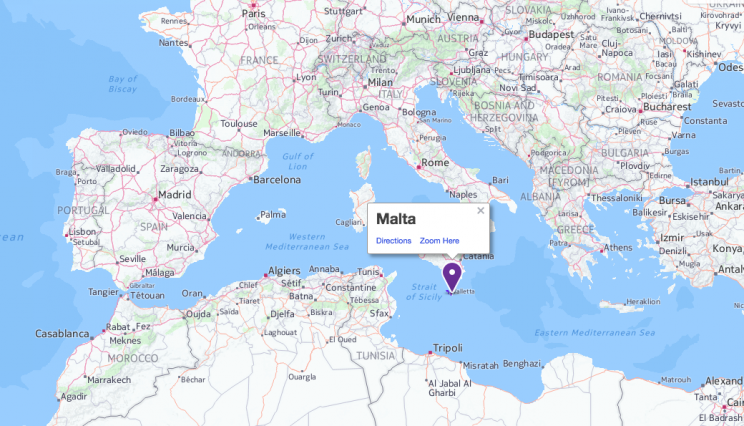Why the island of Malta is important for DraftKings

Daily fantasy sports company DraftKings is launching in Germany on Thursday, Yahoo Finance has learned. The company is opening up a beta version of its platform, complete with all of the sports the app currently offers in the US, including soccer, NFL, MLB, NBA, NHL, and golf.
At the end of January, DraftKings announced it had obtained a gaming license from the Malta Gaming Authority. This month, another daily fantasy sports company, Oulala, announced the same.
Why do fantasy sports companies suddenly care about Malta, a Mediterranean island with a population of 400,000?
The license, called a “controlled skill games license,” labels DraftKings contests as games of skill (as opposed to chance), a designation that was hotly debated in the company’s legal battle with the New York State attorney general last year. More importantly, the Malta license allows a company to operate in many nations across Europe, with the exceptions of a few countries that have stricter rules for daily fantasy sports, like England, France, Belgium and Spain.
It is the Malta license that paved the way for DraftKings to launch in Germany.
While Malta is small, it looms large in the online gaming world; its Malta Gaming Authority (MGA) wields real influence. The MGA only just established its skill games license for daily fantasy sports companies in January.
DraftKings was the first fantasy operator to get one, and Oulala is the first B2B fantasy operator to get one. (Oulala creates white-label daily fantasy games for other companies to offer on their own platform.) Two other fantasy sports operators have obtained them as well, but have not launched, so the MGA cannot release their names.
Sources say that as many as 20 different fantasy sports companies, large and small, daily and “season-long,” have applied for the Malta license in a frenzy. The MGA would not confirm the figure.
FanDuel doesn’t have the Malta license, and sources say it isn’t actively seeking one. That’s likely because DraftKings and FanDuel have announced their intention to merge, so they will eventually be one company—if regulators approve the merger, which is not guaranteed.
The rise of the Malta license
Applying for the Malta license carries an application fee of 2,300 euros, plus an annual licensing fee of 8,500 euros—it all amounts to less than $12,000. That may sound nominal, but it’s enough to weed out some of the very small new operators that are eager to enter the market and think Malta might be the place to start.
“I would say the cost is good, it is high enough that people who don’t have enough money to launch a business will say that it’s too high,” says Valery Bollier, CEO of Oulala. “And one thing in this industry is you see a lot of young guys arriving with 150,000 euro and thinking they can launch a new DFS game in Europe. And it’s not enough. The money is going to disappear very quickly, and then after the company goes down, people will think that DFS is not working. That’s not the case. We need serious competitors to come, because it will help all of us.”
Oulala provides a cogent case study of the problem fantasy sports companies face in Europe, where a select few countries are very strict toward these contests, while the rest are relatively open and lax. Oulala launched four years ago from Malta, but in many parts of Europe, Bollier says, “Legislators were considering DFS to be like sports betting, like a full betting activity. We were strongly fighting against this.”
Meanwhile, the UK license granted to fantasy sports companies is a “pool betting” license, which fundamentally labels a business as iGaming (internet betting), which causes problems in the U.S., where iGaming is banned. DraftKings obtained a UK pool-betting license last year.
“It’s been Kafkaesque, for the last four years,” Bollier says. “Legislators were all saying, ‘This market is going to be too small, we don’t want to spend time on this,’ and we said, ‘Of course the market is small, because you’re not allowing it to grow.’” Oulala worked to lobby the MGA to create the new license, and Bollier sees it as a positive new tide that can lift all boats in the industry.
DraftKings has high hopes in Germany
There’s good reason why the fastest growing department at DraftKings is compliance, according to the company. The law that applies to fantasy sports is still a Wild West, globally, with many countries (and within the US, many states) defining it their own way.
“If I were a startup looking to get into the space, my concern wouldn’t be in one market,” says DraftKings international chief Jeffrey Has, “but in compliance in general. With any of these licenses, you need to hire a lawyer and create a local entity, go through probity, and that’s the heaviest lifting.”

DraftKings will open a new office in Malta this month. The company estimates there are four to five million active fantasy sports players in Germany, and it’s eager to capture them.
As more legal and regulatory clarity comes to daily fantasy sports, expect more companies—both American and otherwise—to zero in on Malta.
“Most people in the industry are starting to see that Europe is going to be a big chance for them,” says Oulala’s Bollier. “Malta is showing the way.”
—
Disclaimer: Yahoo offers its own daily fantasy sports product.
Daniel Roberts is a writer at Yahoo Finance, covering sports business and technology. Follow him on Twitter at @readDanwrite.
Read more:
The daily fantasy sports market has a demographic problem
IT’S OFFICIAL: DraftKings and FanDuel are merging
DraftKings and FanDuel CEOs: Merger is ‘much bigger than us’
The daily fantasy sports industry has changed drastically in just 1 year
Here’s where every state stands on daily fantasy sports legality

